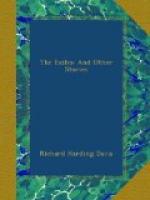“What makes him think that?” demanded the consul, with some shortness. Young Mr. Stedman looked nervously at the consul and at Albert, and said that he guessed some one must have told him.
The consul’s office was divided into four rooms with an open court in the middle, filled with palms, and watered somewhat unnecessarily by a fountain.
“I made that,” said Stedman, in a modest, offhand way. “I made it out of hollow bamboo reeds connected with a spring. And now I’m making one for the King. He saw this and had a lot of bamboo sticks put up all over the town, without any underground connections, and couldn’t make out why the water wouldn’t spurt out of them. And because mine spurts, he thinks I’m a magician.”
“I suppose,” grumbled the consul, “some one told him that too.”
[Illustration: “I never saw a king,” Gordon remarked.]
“I suppose so,” said Mr. Stedman, uneasily.
There was a veranda around the consul’s office, and inside the walls were hung with skins, and pictures from illustrated papers, and there was a good deal of bamboo furniture, and four broad, cool-looking beds. The place was as clean as a kitchen. “I made the furniture,” said Stedman, “and the Bradleys keep the place in order.”
“Who are the Bradleys?” asked Albert.
“The Bradleys are those two men you saw with me,” said Stedman; “they deserted from a British man-of-war that stopped here for coal, and they act as my servants. One is Bradley, Sr., and the other Bradley, Jr.”
“Then vessels do stop here occasionally?” the consul said, with a pleased smile.
“Well, not often,” said Stedman. “Not so very often; about once a year. The Nelson thought this was Octavia, and put off again as soon as she found out her mistake, but the Bradleys took to the bush, and the boat’s crew couldn’t find them. When they saw your flag, they thought you might mean to send them back, so they ran off to hide again; they’ll be back, though, when they get hungry.”
The supper young Stedman spread for his guests, as he still treated them, was very refreshing and very good. There was cold fish and pigeon pie, and a hot omelet filled with mushrooms and olives and tomatoes and onions all sliced up together, and strong black coffee. After supper, Stedman went off to see the King, and came back in a little while to say that his Majesty would give them an audience the next day after breakfast. “It is too dark now,” Stedman explained; “and it’s raining so that they can’t make the street-lamps burn. Did you happen to notice our lamps? I invented them; but they don’t work very well yet. I’ve got the right idea, though, and I’ll soon have the town illuminated all over, whether it rains or not.”
The consul had been very silent and indifferent, during supper, to all around him. Now he looked up with some show of interest.
“How much longer is it going to rain, do you think?” he asked.




